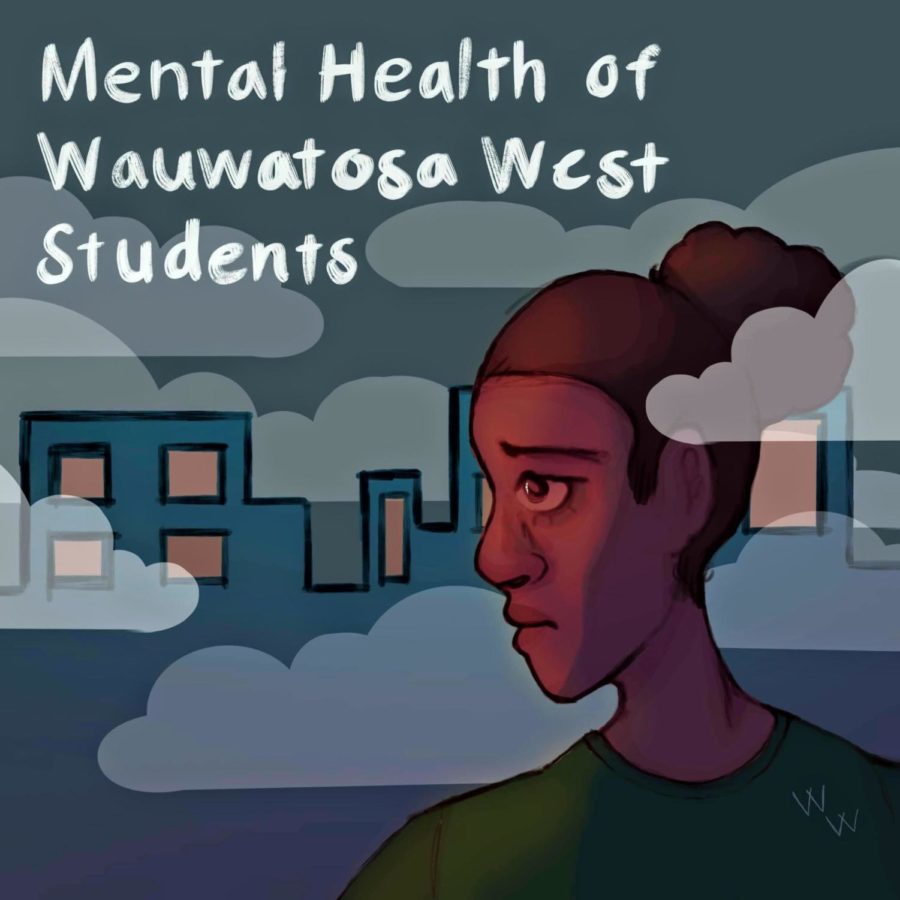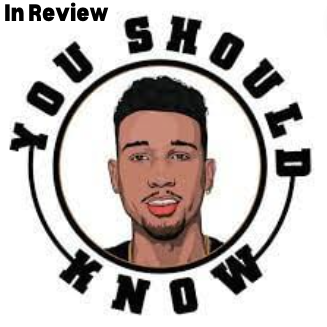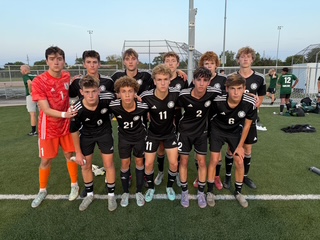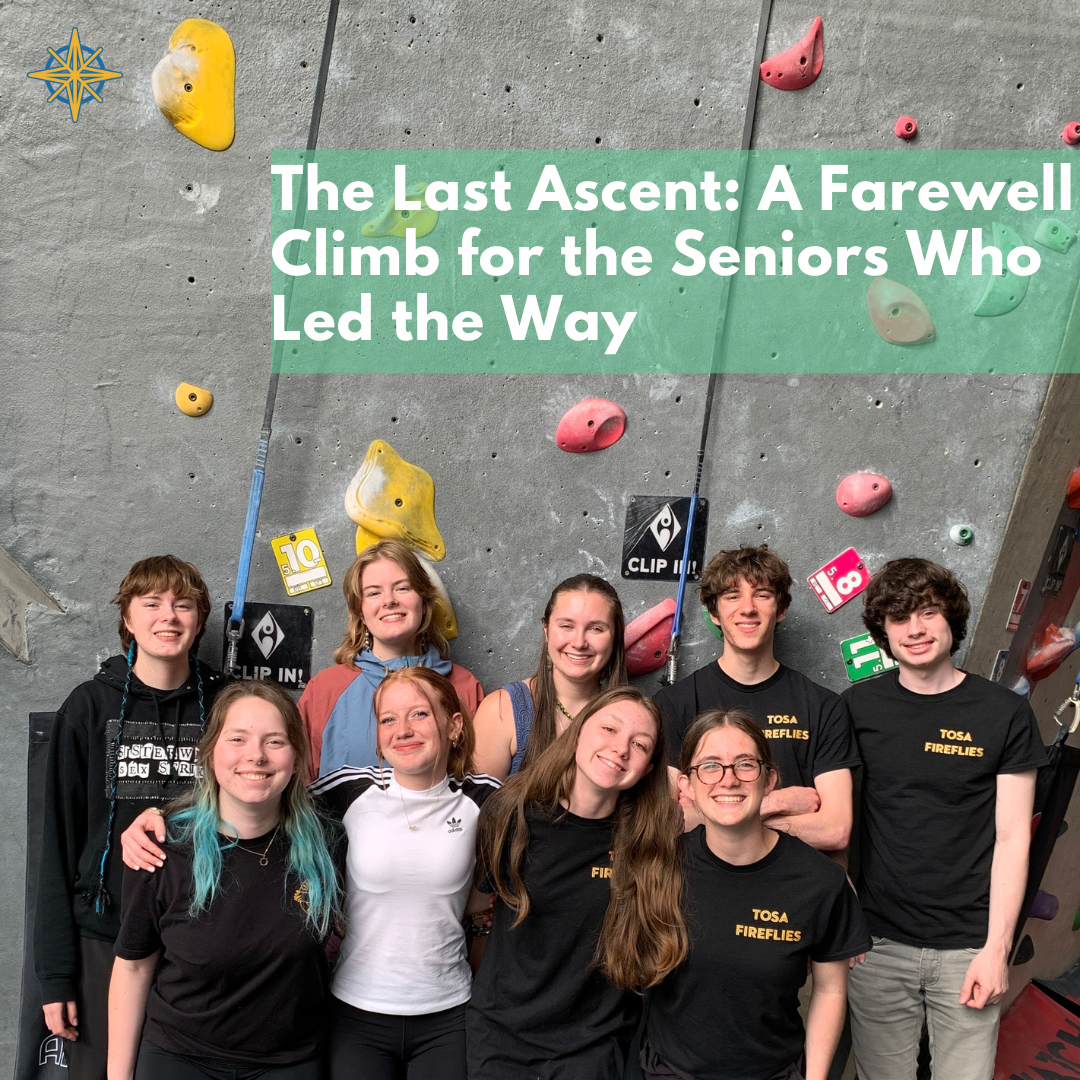Mental Health of Students at Wauwatosa West
March 9, 2022
The names of these students have been changed to protect their privacy.
“I have always struggled with mental illness. I have OCD and have felt the effects of it for my entire life. When I was younger, I would think about things and I really couldn’t control my thoughts. I would stay up all night worrying about the deaths of my family members, my house burning down, the start of a war, and countless irrational situations. I didn’t realize this wasn’t normal,” said Tosa West junior student, Jenny Anderson.
Anderson’s OCD made them feel like they had to be without fault. School was a struggle for her, and she started to fall behind.
“I couldn’t turn in an assignment unless it was as perfect as possible. This was so stressful because not turning in assignments was easier than stressing for hours over every single detail of one. ” said Anderson
When Wauwatosa West closed the week before spring break because of COVID-19, she felt the impact on her mental health immediately.
“It felt like an apocalypse. I had reached a point where life was miserable in every way and I knew I needed help. I refused to go to school and continued to ask my parents for help,” Anderson said.
Anderson tried expressing what she was going through to her parents, but they didn’t understand right away. They punished her since she wouldn’t do her homework or go to school.
“They thought that my symptoms of depression were just laziness. There was constant fighting and screaming and bad attitudes. We were fighting a war against each other instead of fighting one together,” said Anderson.
Eventually, her parents grasped what she was experiencing and grew to become extremely supportive. They helped her with her health, as much as they could. Finally, she was enrolled into a day program at Aurora.
“There was a month-long wait list but when I finally got it, it was so beneficial. It was group therapy Monday-Friday from 8am-2pm. I learned so much about myself and I truly got better. I was able to go back to school and finish out the school year, passing every class,” Anderson said.
She grew to have a support system through her friends and family.
“I am really grateful for them. It’s important to comfort someone who is struggling. I get that it is hard for people to understand mental illness if they have never experienced it, but it’s important to have an open mind and really try to put yourself in the other person’s shoes,” said Anderson.
Anderson also knows that the challenges she faces with her mental health problems also impact her loved ones.
“I feel so horribly for my family because throughout this time they were so worried. My younger siblings had to learn how to comfort and support me and I feel so bad that I caused them to have to grow up so fast,” expressed Anderson.
Things are looking up for Anderson though, “This school year has been hard, I will admit, but not nearly as miserable as last year. I am continuing to work with a therapist and I take medication. I am trying very hard to stay on the right path,” said Anderson.
The COVID-19 pandemic has only exacerbated/intensified the growing mental health epidemic.
“There’s a huge spike and need for long term counseling services. That started showing up even before the pandemic. Things like anxiety, depression, and other stress related mental illnesses were on the increase before the pandemic arrived, especially for high school students,” said Tosa West counselor, Brian Hoffman.
Through the increased struggles, came an increase of mental health issues that was noticed by some.
“As a building leader, I feel that we have observed an increase in the number, frequency and complexity of mental health issues in the last two years in students and staff,” said Tosa East principal, Nick Hughes.
With the spike seen regarding student’s mental health, the district is trying to add more support.
“I firmly believe that young people need more trusted adults to form relationships with in order to address mental health needs,” said Wauwatosa School District superintendent, Demond Means.
The district is trying to implement more assistance to students regarding their mental health.
“In the District’s ESSER plan, we are recommending an increase in secondary school counseling services. Additionally, in conjunction with the City of Wauwatosa, the District is seeking to increase our allocation of social workers by two additional staff members. Finally, the District has partnerships with external counseling agencies that work with students on a weekly basis to address various mental health needs. Family Services of Waukesha and St. Charles are the two agencies,” said Means.
Currently, the resources that the schools within the district can provide are being utilized by students and staff.
“The backlog in appointments for professional therapists has increased the support services that are being offered at schools and the complex needs being presented to school staff which require support,” said Hughes.
One resource that students turn to are school counselors.
“We do our best to help kids survive the day, week, or semester, and if kids need more than that then we’ll refer out and recommend professional mental health services. A good way to think of it, we’re not meant to be long term therapy,” said Hoffman.
Although school counselors aren’t trained in the same way as community therapists, they can still provide assistance and services.
“Sometimes it’s a few check-ins, sometimes I set up weekly appointments with students. I’ll encourage the student to seek professional help, but if that can’t happen, I’d do my best to help them through what’s going on, here at school,” said Tosa West counselor, Megan Christensen.
Talking to students about their mental health is a conversation that counselors are more than willing to have.
“I’ll ask the student what’s going on and let them share what they want to. It might be hard for a student to open up about what’s going on so I’ll never push a student to tell me more than they are comfortable with,” said Christensen.
There are resources that can be provided and assistance that can be set up for students and their family members, like the Student and Family Assistance Program.
“It’s something we commonly refer to because it’s free, to any family member or student in our school. They provide 6 free sessions, and if someone needs more than that, they can help set them up with additional counseling,” said Hoffman.
To get further counseling, “It’ll depend on the family’s resources or health insurance. There are services out there that kids can access which are cost free. Or sometimes a sliding fee scale which is when you pay for what you can afford,” said Hoffman.
When analyzing the situation at hand regarding mental health within the district, Means is optimistic to see the mental health services being utilized.
“I am pleased that students and their families are recognizing the warning signs and are seeking assistance. The increase can be viewed in two ways: (1) there is an increase or (2) the stigma of seeking assistance for mental health has subsided in society and people are more willing to get the support they need,” said Means.
It’s not only important to be able to ask for help, but it’s just as important to know when to ask.
“When your mental health impacts your family, your work or school, or your relationships with your loved ones, that’s one of the biggest signs. The good news is that every single mental health issue is treatable, and people with even the most severe mental health situations there’s help in place so people can live long and productive lives,” said Hoffman.
Asking and getting the right help is necessary for someone to improve their overall health.
“Mental health is something that really cannot be controlled. It isn’t something that should be glamorized or made fun of. Mental illnesses are just as important as physical illnesses. Mental illness is a fatal disease and should be treated like one,” said Anderson.
It’s normal to struggle with mental health. For high school students especially, mental health issues are very common.
“There’s no “cure” per se, but there’s treatment for all kinds of health issues, that’s the silver lining, there’s a way out, and particularly for teenagers, who’re going through a difficult time, life gets better, there’s a better future waiting beyond the struggles of going through adolescence and teenage years,” said Hoffman.
Tosa West sophomore, Susan Smith can attest to this, after surviving through her own battle with mental health.
“As a teenager in the world today, I’ve realized how prominent mental health struggles are in our generation. No one should be ashamed to reach out, however that does not mean that, poof, you are ‘cured’. Choosing to prioritize your mental health is a choice you should make everyday,” said Smith.
The process of recovery will look different for everybody.
“Usually the best treatment is a combination of talk therapy, counseling, and/or some sort of medication or hospitalization. It’s usually those two things,” said Hoffman.
For Miller, getting help for his anxiety and panic attacks took time.
“There was about one and a half months of therapy, then a few more months of exposure therapy, and some anxiety medication later on, and then I re-entered a somewhat “normalcy”.” said Miller, “In my experience, I will never go back to being who I was before, and that’s okay. There are still times when I have to push myself to do small tasks and that’s alright. The most important thing though is to not let yourself compare your experience to others,”
Whereas, recovery for ADHD is different from other forms of mental health. There are medications people can take but it’ll mostly improve or stay the same over time.
“My life living with ADHD has changed alot since I was diagnosed, which was when I was 8 or 9. Now however it’s gotten alot better. Many people diagnosed with ADHD tend to still have it in adulthood, so it’s very common that it improves as you get older,” said Johnson.
There is medication that can help some people with ADHD, but for Johnson, that wasn’t the best path for his recovery.
“It used to be a lot worse and we tried taking medication and going to a kind of therapy to help, the medication worked great but we had to stop because it would cause me to lose my appetite and I wouldn’t eat for a whole day sometimes because I would never get hungry,” said Johnson.
Being able to ask for help is important because that’s the first step in getting better.
“You cannot suffer through this mindset by yourself. It is extremely hard to do but you have to want to get better and want to get help. Surprisingly, it is difficult to want to get better because you are pushed out of your comfort zone. But seriously, the only way to recover is to want to recover,” said Anderson.
The importance of mental health cannot be stretched further, the state of someone’s mental health affects their everyday lives and should always be made into a priority.
“Mental health struggles are not “one size fits all”. Anyone can struggle with mental health. I feel that as a society we need to stop judging people for feeling the way they do, despite how they look, the status that they have, how “happy” they seem, or successful they may be. No matter who you are, we are all human, and all feelings are valid,” Smith said.
Self-Harm Hotline – 1-800-DONT CUT (1-800-366-8288)
Suicide Hotline -1-800-273-8255
SAMHSA (Substance Abuse and Mental Health Services) -1-800-662-HELP (4357)
RAINN (National Sexual Assault Hotline) – 612-871-5111
Milwaukee County Psychiatric Crisis Line – 414-257-7222
211 (Social Service Hotline) – Dial 211
CMC (Children’s Mobile Crisis Team) – 414-257-7621















